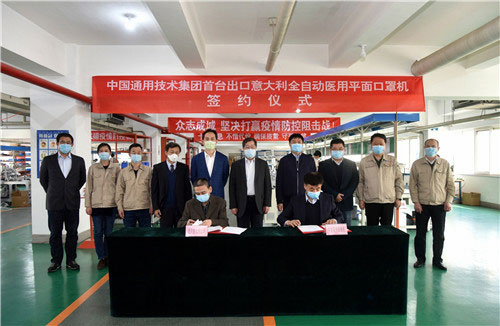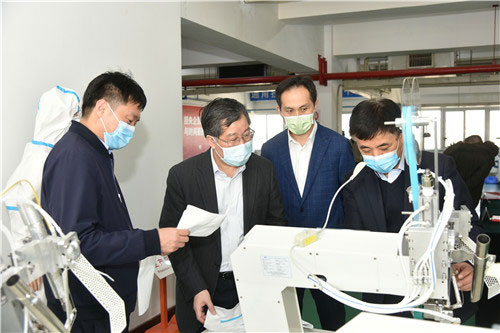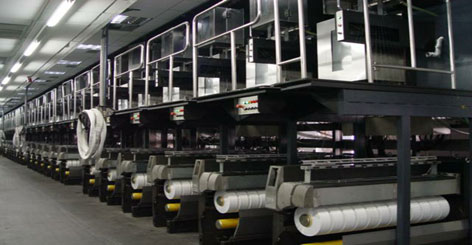FW
The German Fashion House Hugo Boss’ Chief Executive Officer Mark Langer has stepped down. Langer will leave the company on September 30 but will continue as a consultant until the end of the year due to the COVID-19 outbreak. Langer has been holding the office since 2016 and prior to this he had been Finance Chief of the company from 2010.
Hugo Boss discarded the outlook it gave for 2020 and took action to protect its cash liquidity, suspending store renovations and new openings and limiting the inflow of stock.
Back in 2016, when Hugo Boss was suffering from steep fall in sales in the US and China, Mark took over from Claus-Dietrich Lahrs. Until the COVID-19 outbreak, he had managed to stem the decline, but the stock had still underperformed.
Mark wanted Hugo Boss to return its roots selling premium men’s clothing and offer more casual and sportswear, while his predecessor had pushed to make the label more of a luxury brand and invested in womenswear.
HSBC Bangladesh has announced a set of measures to help textile and garments clients tide over the economic fallout of COVID-19 pandemic. The lender will provide special short-term loans of up to one year with principal moratorium for four months. It will also allow three months' moratorium against existing term loans enjoyed by businesses belonging to the textile and garments sector, according to a press release issued by HSBC Bangladesh.
During the moratorium period, clients will not be required to give any installment and the lender will not seek any repayment amount from them as well. HSBC will provide up to 90-day extension of import liability maturing in next three months where export shipments are delayed.
It will work to ease cash flow pressures faced by businesses and help customers tackle the market uncertainties, including disruptions to their supply chains. To ease the pressure on Bangladeshi economy, clients will be allowed to enjoy trade relief in the form of waiver of letters-of-credit (LCs) commission and margin requirements for the import of medicine, medical equipment and accessories used to treat COVID-19.
Customers facing delivery disruptions owing to late shipment and presentation of documents will have amendment fees on LCs waived, said HSBC, one of the largest banks in the globe serving more than 40 million customers in 64 countries and territories of the world.
The bank will provide support to customers to onboard onto HSBC's digital platforms to enable the flow of trade to continue. Along with the textile and garments sector, the lender will actively evaluate and try to introduce specific initiatives to support its customers in other sectors as required.
As the lockdown continues across the country with low buyer sentiment for garments, Indian fashion brands are focusing on e-commerce. Fashion shows have been cancelled and supply chain management has been severely affected. Many start-ups are hoping the government comes out with some relief measures to compensate for their business losses.
Brand Sarah & Sandeep’s focus has shifted towards its e-commerce platform and its international clients with whom it consults over Skype. The company has also extended delivery periods for earlier orders. It expects to break even at least for the coming month as it has cut all unnecessary costs.
With all their stores closed at the moment, online orders of FabAlley and Indya have slipped by 25 per cent. With a ban on social gatherings, occasion wear brand Indya has witnessed a dip in orders. Moreover, given the uncertainty of the crisis, people are not spending on apparel, they said.
Supply chain management across various functions has been adversely impacted, hampering overall business execution. Every business in such a situation will face a hit and that is something unavoidable.
Similarly, the members of South India Imported Machine Knitters Association are not in a position to repay bank loans as a result of which banks may classify the units as non-performing assets.
There is no clarity on when all the export and domestic supply chains will come back to normal and when will the finance ministry implement remedies. The exports are expected to return to normalcy in June or July.
While Liberty Shoes had a positive outlook on growth and expansion plans for the coming fiscal, however, it is now adopting a “wait and watch” approach in the wake of the Covid-19 pandemic. Footwear purchase, which is more of discretionary spend, could get impacted on the back of poor sentiments particularly when travel plans are getting curtailed and celebrations are getting cancelled.
However, on a positive note, it could be an opportunity for India to reduce its dependence on China in terms of imports and focus on domestic manufacturing. Liberty Shoes plans to establish a firm footing in Tier-II and III towns of northern and central India, where it is among the dominant players. The company aims to add 50-100 stores every year, primarily in the Tier-II and III towns.
The company has been witnessing good growth from comfort footwear segment under its brand Healers as people are becoming increasingly conscious of the need for comfortable footwear. It is also witnessing good growth in the sports category and the kids segment.
The Bangladesh government is currently negotiating with major importer countries on how to offset the loss incurred from the Coronavirus spread. It is in discussion with the EU, the US and G7 countries. The BGMEA says, export loss due to COVID-19 would be around $2 billion. The government has assigned its concerned department to assess the loss in exports and in remittances.
Local enterprises are producing corona preventive gears and already countries like the USA has requested Bangladesh to supply the gears. Corona preventive equipment from China is likely to arrive in the country soon by a special flight. Some private firms are also importing corona preventive equipment from China which will be available within a couple of days. Meanwhile the pandemic is taking a huge toll on Bangladesh, which is the world's second-largest garment exporter. The industry is rapidly losing orders, and millions of jobs are at stake. Foreign brands are increasingly delaying and canceling orders. "Our orders until June have been canceled,” says Siddiqur Rahman, VP, Federation of the Bangladesh Chambers of Commerce and Industries (FBCCI). The situation is dire, he added. BGMEA claims that foreign companies are also canceling orders that are already in production or completed.
March 23, Beijing Chonglee Machinery Engineering Co.Ltd., a subsidiary to China Textile Academy, signed a business contract at its medical-purpose equipment and protective gear workshop to start up the export of its first batch of facemask lines to Italy.
 |
| (Mr, Wang Xusheng{in the middle}, Vice President of China General Technology Group and Mr. Zhuang Xiaoxiong (the forth on the right in the rear line), Chairman of China Textile Academy, are at the ceremony to congratulate on contract signing) |
The signing ceremony was actually an in-house event as the seller and buyer both live under one roof because Beijing Chonglee Machinery Engineering on the seller side and Italian Branch Company of China General Technology on the buyer side both are parts of China General Technology Group Corp., and the latter responded quickly to the critical demand of medical supplies in Italy and contacted Chonglee Machinery Engineering at the first-things-first time for placing purchase order to import the fully-automatic machines for flat-type face masks to be shipped to Italy ahead of those local manufacturers as in-time “ammunition” for local government to combat the spreading disease.
Ever since its first automatic flat face mask machine was rolled out, there have been 37 machines sold within half a month, including 13 ones for domestic market to ease the shortage of mask production. The contract for the mask machines to go to Italy is a milestone for Chonglee Machinery Engineering for doing business to European countries, and also a breakthrough for medical protective gear and technology to the advanced country in consideration of the fact that Italy itself is a highly advanced country in terms of textile machinery technology and manufacturing.

The contract was signed at the time when the COVID-19 situation continues to improve in China’s endeavors for the infection control and prevention, and China General Technology Group has its advantage of synergetic resources for engineering, trading and manufacturing to render assistance to overseas combat against the rampant virus. Beijing Chonglee Machinery Engineering will continue to speed up its R&D for medical protective gear and technology for further production increase and expansion in quick response to the market needs by virtue of its technological and manufacturing strengths. Besides this new line of business started becuas of the market crisis, Chonglee is best known for its man-made fiber equipment and technology in China, its high speed POY spinning line, FDY combination series, industrial yarn spinning machine, differentiated fiber spinning line, and the highly applaudable automatic winders and texturizers etc., all make it a reliable business partner both at home and abroad.

Its mother organization, China Textile Academy, which was a science and technology institute of the ex-Ministry of Textile Industry in China, and is now also part of China General Technology Group as a result of the state-owned assets reformation and restructuring in more market-oriented direction, adds up more value to its scientific origin of birth, and to its technical strength in the present big family under the new umbrella.
Contributed by Mr. ZHAO Hong
He is working for CHINA TEXTILE magazine as Editor-in-Chief in addition to being involved in a plethora of activities for the textile industry. He has worked for the Engineering Institute of Ministry of Textile Industry, and for China National Textile Council and continues to serve the industry in the capacity of Deputy Director of China Textile International Exchange Centre, V. President of China Knitting Industry Association, V. President of China Textile Magazine and its Editor-in-Chief for the English Version, Deputy Director of News Centre of China National Textile and Apparel Council (CNTAC), Deputy Director of International Trade Office, CNTAC, Deputy Director of China Textile Economic Research Centre. He was also elected once ACT Chair of Private Sector Consulting Committee of International Textile and Clothing Bureau (ITCB)
Effective April 1, 2020 Walmart has appointed Sameer Aggarwal to the position of chief executive officer of its India, replacing Krish Iyer, who is retiring from full-time management but will continue to work in an advisory role at Walmart India until June 30.
Aggarwal had joined Walmart India in April 2018 as chief strategy and administrative officer. He was then promoted to deputy CEO of Walmart India in January, making this new appointment his third promotion. He has over two decades of international business experience, including leadership roles at Yum Brands, Sainsbury’s in the UK and China and McKinsey & Co in Australia.
Aggarwal will report to Dirk Van den Berghe executive vice president and regional CEO of Asia at Walmart. He will lead Walmart’s growth strategy in the Indian market. Walmart currently operates 28 Best Price cash-and-carry stores in the country.
Dirk said in a statement: “Sam has done a fantastic job in the past two years. He led the charge to make our proposition more customer-centric, developing digital offerings to prepare for our omnichannel services in the future. I look forward to seeing him make a greater impact on our Best Price members and associates in India.”
Taking into account the public health concerns, travel restrictions and market volatility due to the Coronavirus outbreak, Messe Frankfurt Trade Fairs India decides to postpone the Mumbai edition of Screen Print India 2020 scheduled to be held from 24 – 26 April 2020.
“We have had to take this time-sensitive decision in the interest of our exhibitors, visitors, employees and all the stakeholders involved. While it is a tough call for us as organisers, it is a responsible decision and we are happy to have the full support of the industry,” says Mr Raj Manek, Executive Director and Board Member, Messe Frankfurt Asia Holdings Ltd.
With a large international contingent from China, France, Germany, Italy, Japan, Malaysia, Switzerland, Singapore, Thailand and the USA slated to participate at the upcoming fair in April, the travel restrictions put in place by governments and local authorities across the world make it difficult for the exhibition to take place as normal and demanded an immediate analysis of the situation.
The Mumbai edition is planned to be held in the later part of the year, and the new dates will be announced in the coming weeks, after consultations with the fair’s international and local supporting associations. The Delhi launch edition continues to be on schedule from 21 – 23 August 2020.
Modefabriek, an Amsterdam event scheduled to be held between July 5 -6, is the latest fashion event to be cancelled due to the coronavirus outbreak.
The organizers of the show said in a statement: “The decision to cancel the upcoming summer edition of Modefabriek regrettably proved to be unavoidable. The Corona pandemic has had an enormous impact on everything that we hold dear, and we realise that it is now impossible for our event to go ahead as planned.”
Looking forward, they would continue to develop the show for upcoming editions. “Here at Modefabriek, we were already developing a broader platform for our branch – in addition to our live event. To offer online and offline solutions, to be a contact point and connector,” the organisers further added.
With the increasing uncertainty, increasing numbers of retailers are temporarily closing their stores in response to the COVID-19 outbreak.
PVH has closed all company operated stores in Europe and North America, VF Corporation has closed all company operated retail stores in North America, while H&M Group, John Lewis, Primark, New Look and Debenhams are just a few of the companies which have closed their stores in the UK.












